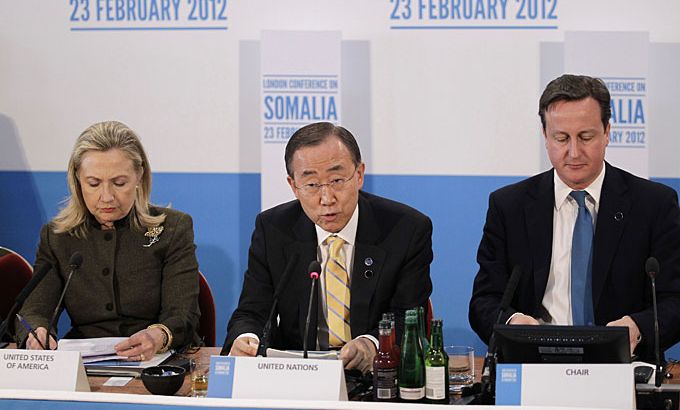
Saving Somalia: A wasted effort?
We ask how serious world leaders at the London conference are in tackling problems facing the war-torn African state.
An international conference on Somalia has taken place in London on Thursday, with representatives from 40 countries attending.
|
“We cannot exclude any kind of an attempt at this point to explore a solution in which Somalia can be stabilised so that institutions of the state can function. This conference may not provide the solution but it could bring about a situation where state institutions can work, there would be rule of law and there would be opportunities for Somalis to regain their sovereignty.“ – George Saitoti, the Kenyan internal security minister |
David Cameron, the British prime minister, said the crisis in Somalia could endanger global security.
Fighting the Somali Islamist group al-Shabab, poverty and piracy were at the forefront of the subjects discussed there.
Also high on the agenda was the future of the African Union peacekeeping forces after their mandate expires in August.
Sharif Ahmed, the president of Somalia, kicked off the London conference by welcoming the support of the international community.
“Ladies and gentleman, who represent all countries in the world and international and regional organisations. All of you who have exerted every sincere effort so that you could put an end to the suffering of the Somali people,” he said.
|
“The central issue is, can Somalia have a functioning state that controls all the different problems. We know that Somalia’s problem is a regional and international problem. We cannot solve this as a piecemeal. Expanding troops is only a means to a solution, not the solution, which is a functioning Somali state.” – Hassan Sheikh Mahmoud, the head of Somalia’s independent Peace and Development Party |
“We would like to like to say to all of them that we indeed appreciate this wonderful effort that you have exerted… this care, this humanitarian feeling which has been so manifest in your people, in governmental organisations, and non-governmental, as far as the Somali question is concerned.”
Hillary Clinton, the US secretary of state, told the conference that her government will invest millions of dollars towards improving the situation in Somalia.
Meanwhile, the London conference has drawn mixed feelings on the streets of the Somali capital, Mogadishu.
So, what is the future of the African peace keeping forces, and why should the world take the Somali conflict seriously?
To discuss this with presenter Adrian Finighan on Inside Story are: Hassan Sheikh Mahmoud, the Head of Peace and Development Party, an independent Somali political party; David Anderson, a professor of African Politics at the University of Oxford and a fellow at St Cross College; and George Saitoti, the Kenyan internal security minister.
|
“The history of Somalia in the last 20 years has been a series of injections of outside resources to try and move people toward a negotiated solution. Essentially that money has been eaten by the people who’ve been given it. Now it has become a kind of donor-dependency locked into the process of negotiation in Somalia. I worry the next stage of this London process to get people in Somalia to discuss the architecture of potential changes that the West will have to put money on the table.” David Anderson, an African Politics professor at Oxford University |
| Past conferences:
There have been around 20 international conferences on Somalia since the collapse of central authority in 1991. The major reconciliation conferences of the last two decades attempted to achieve peacemaking and peacekeeping. > In 1991, the first attempt at reconciliation aimed at re-establishing a Somali government was followed by a bloody civil war in Mogadishu and the south. > Between 1993 and 97, Ethiopia hosted four conferences that led to agreements and the creation of a National Salvation Council. But fighting continued. > In 2000, the Arta conference held in Djibouti, was different as it sought the input of traditional leaders. It created the Transitional National Government. > Between 2002 and 2004, conferences were held in Kenya, which led to the establishment of a Transitional Federal Government in early 2005. > In 2007, the National Reconciliation Conference saw the participation of more than 3,000 people from all of Somalia’s regions and clans, but opposition leaders held a separate meeting to join forces to fight the Transitional Federal Government. |
| Somalia is a war-torn country in the Horn of Africa with a population of about 10 million. It was a former British protectorate and an Italian colony. It has not had an effective central government since 1991. Somalis have been affected by 20 years of violence.
Al-Shabab says it has joined al-Qaeda. It now controls much of southern Somalia. The name roughly means ‘Youth Movement’ and it was formed in 2006, first proclaiming ties with al-Qaeda in 2007. Military forces from neighbouring countries are currently engaged in fighting the group. The group’s goal is to impose sharia in Somalia. The US has declared al-Shabab a “terrorist organisation”. |